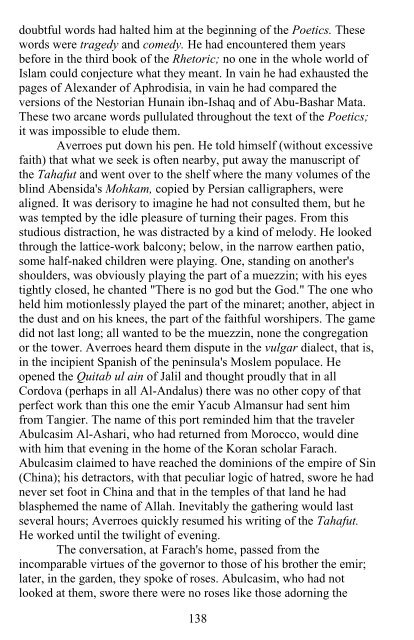Jorge Luis Borges - Labyrinths
Jorge Luis Borges - Labyrinths
Jorge Luis Borges - Labyrinths
Create successful ePaper yourself
Turn your PDF publications into a flip-book with our unique Google optimized e-Paper software.
doubtful words had halted him at the beginning of the Poetics. These<br />
words were tragedy and comedy. He had encountered them years<br />
before in the third book of the Rhetoric; no one in the whole world of<br />
Islam could conjecture what they meant. In vain he had exhausted the<br />
pages of Alexander of Aphrodisia, in vain he had compared the<br />
versions of the Nestorian Hunain ibn-Ishaq and of Abu-Bashar Mata.<br />
These two arcane words pullulated throughout the text of the Poetics;<br />
it was impossible to elude them.<br />
Averroes put down his pen. He told himself (without excessive<br />
faith) that what we seek is often nearby, put away the manuscript of<br />
the Tahafut and went over to the shelf where the many volumes of the<br />
blind Abensida's Mohkam, copied by Persian calligraphers, were<br />
aligned. It was derisory to imagine he had not consulted them, but he<br />
was tempted by the idle pleasure of turning their pages. From this<br />
studious distraction, he was distracted by a kind of melody. He looked<br />
through the lattice-work balcony; below, in the narrow earthen patio,<br />
some half-naked children were playing. One, standing on another's<br />
shoulders, was obviously playing the part of a muezzin; with his eyes<br />
tightly closed, he chanted "There is no god but the God." The one who<br />
held him motionlessly played the part of the minaret; another, abject in<br />
the dust and on his knees, the part of the faithful worshipers. The game<br />
did not last long; all wanted to be the muezzin, none the congregation<br />
or the tower. Averroes heard them dispute in the vulgar dialect, that is,<br />
in the incipient Spanish of the peninsula's Moslem populace. He<br />
opened the Quitab ul ain of Jalil and thought proudly that in all<br />
Cordova (perhaps in all Al-Andalus) there was no other copy of that<br />
perfect work than this one the emir Yacub Almansur had sent him<br />
from Tangier. The name of this port reminded him that the traveler<br />
Abulcasim Al-Ashari, who had returned from Morocco, would dine<br />
with him that evening in the home of the Koran scholar Farach.<br />
Abulcasim claimed to have reached the dominions of the empire of Sin<br />
(China); his detractors, with that peculiar logic of hatred, swore he had<br />
never set foot in China and that in the temples of that land he had<br />
blasphemed the name of Allah. Inevitably the gathering would last<br />
several hours; Averroes quickly resumed his writing of the Tahafut.<br />
He worked until the twilight of evening.<br />
The conversation, at Farach's home, passed from the<br />
incomparable virtues of the governor to those of his brother the emir;<br />
later, in the garden, they spoke of roses. Abulcasim, who had not<br />
looked at them, swore there were no roses like those adorning the<br />
138


